by Gabriel Neeb
I don’t care what your history books tell you. The biggest event of 1996 wasn’t Bill Clinton’s reelection or the premiere of the classic movie Independence Day. It was the release of all four issues of the Mark Waid–Alex Ross series Kingdom Come from DC Comics.
On Saturday at the San Diego Comic-Con 2024, Waid appeared along with key members of the team making a documentary about Kingdom Come for the “The Legend of Kingdom Come: Documentary Preview” panel. Moderated by Mike Roe of The Wrap, Waid was joined by director Remsy Atassi, producer Sal Abbinanti, and Arrowverse writers Shawna Benson and Julie Benson.
Roe began the panel with the trailer for the documentary, which features Waid and Ross, but also comics luminaries like Brian Pulido, Gene Ha, and Todd Mcfarlane being interviewed about Kingdom Come.
Prompted by Roe, Waid began to tell Kingdom Come‘s origin story. He said artist Alex Ross had just finished the series Marvels with writer Kurt Busiek, and he’d come to DC Comics with an idea and a bunch of sketches. He told DC he only wanted to work with a writer who knew DC.
Enter Waid, who knew DC mythology up to and beyond things like the names of each member of the Kryptonian Science Council. Among other things, Waid is said to know Clark Kent’s social security number. While this information may be accessible through a simple Google search now, it was not easily accessible in the mid-’90s.
Waid and Ross met over a very productive lunch, and then Waid traveled to Ross’s hometown of Chicago for a weekend to develop the story. Over the course of these meetings, Waid found his “way in” to Superman in one of the series’s final moments where Superman puts on Clark Kent’s glasses, reclaiming his humanity in the process.
During the creation of Kingdom Come, Waid would receive faxed drawings from Ross, who averaged 10 pages of art a month.
The Legend of Kingdom Come producer Abbinati (creator of Atomika) was involved in the creation of Kingdom Come almost from the beginning. Abbinati was a young creator in Chicago and said he was lucky to be hanging around Ross at the time. One day, Ross asked Abbinati to model for him. He said he agreed with some trepidation because… well, it was weird. It got even weirder when Ross gave him a Captain Marvel (Fawcett Comics version) costume (which may have come from Paul Dini) to use during sessions.
Abbinati soon learned that Ross was using models to create photo references for the character designs in Kingdom Come. Abbinati was the reference for Captain Marvel. He described his unintended fame from this involvement as “rough.” His friends teased him about the resemblance but as the series came out, he would also have fans of Kingdom Come approach him for autographs including—and this might be the highest praise possible for his endeavors—fans of the Fawcett superheroes, who would often congratulate him when they learned he was Captain Marvel. Would he do it again? Only if Ross could get a better costume.
Returning from that digression, documentary director Attasi spoke about conducting more than 30 interviews and being allowed to see archival material related to Kingdom Come. Some of Ross’s childhood sketches of DC heroes appeared in the trailer, seen above.
“Kingdom Come is very cinematic,” said Arrowverse writer Shauna Benson. Before the big superhero boom of the 2000s, there weren’t a lot of good superhero movies. There were the 1978 Superman and the Tim Burton Batman films, but nothing like the offerings of the modern day. Benson said Kingdom Come was just “really really well done,” especially in the ’90s.
Roe then asked why the story is still with us and Waid explained his thoughts about Superman’s motivations and why he would quit. From there came the character Magog—the stand-in for the hordes of “grimdark,” hyper-violent characters that were popular in the early- and mid-’90s. Waid and Roe went on to discuss that for all appearances, Superman builds a gulag in Kingdom Come. Batman has turned the Gotham of the series into a police state. No one in the story is completely right.
Waid remarked, “I see Superman’s fascism clearer now than I did 30 years ago.” Waid then admitted he didn’t quite have an answer to Roe’s question about the story’s continued relevancy and that he’d been bluffing for the last few minutes.
At the time, Waid explained, DC had one mandate: Superman had to have the mullet, at least in the “current times” sequences (Kingdom Come is set in the future). Waid complied even though it violated his belief in creating the essential, classic versions of the characters.
No discussion of Kingdom Come can occur without covering the magnificent art of Alex Ross. Among the many people used as character models, the panel paid special attention to the model used for Kingdom Come narrator Norman McCay—Ross’s father. This was especially poignant because Ross’s father passed away during documentary production.
Roe then asked more about Ross and his involvement with the documentary, as Ross is not known to give a lot of interviews. Abbinati responded that it wasn’t the problem one might think: “Kingdom Come is Alex’s baby.” Ross was happy to talk about the book.
Waid also spoke of Ross’s love for the comics characters of the Golden and Silver Ages: “We could argue about Martian Manhunter for half an hour, and we did!”
Roe then noted that Kingdom Come Superman’s shield seems to have been adapted into the shield for Superman in director James Gunn’s 2025 Superman film. Waid was aware of this and stated, “I trust James Gunn 110%.”
To finish off the main portion of the panel, Roe showed a clip detailing the early outline work for Kingdom Come. Then the Q&A began.
Q: “What would it take to bring Alex Ross back to DC?”
Waid: “Maybe a cover if I’m lucky.”
Q: “If you were doing Kingdom Come now, what DC characters would you use?”
Waid: “Jon Kent, the son of Superman.”
Q: “What canon events [events that are key to the character, inspired by the Spider-Verse films] of Superman’s life would you [Waid] use if you were writing a Superman biography?”
Waid: “I like the Grant Morrison school of ‘it all happened’… except maybe the mullet.”
One thing Waid wouldn’t accept was that “[Superman] never killed anybody.” This was met by the loudest applause of the panel.
One of the final questions was about the “needle-in-haystack” cameos [Beppo the Supermonkey, the Beatles and the Monkees, etc] that characterize Kingdom Come. Waid said that unless he specifically scripted the cameo, they were all Ross’s doing. Waid’s final words on the subject: “This was a story about generals, not infantry.”
The Legend of Kingdom Come will launch on Kickstarter this fall. Sign up for updates here.
Stay tuned for more SDCC ’24 coverage from The Beat.



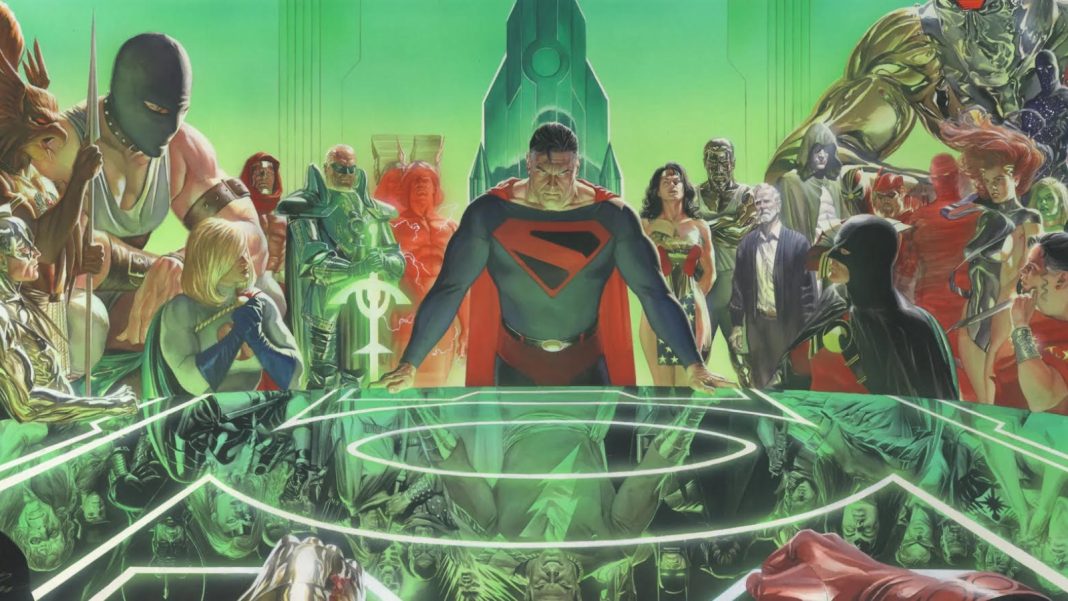
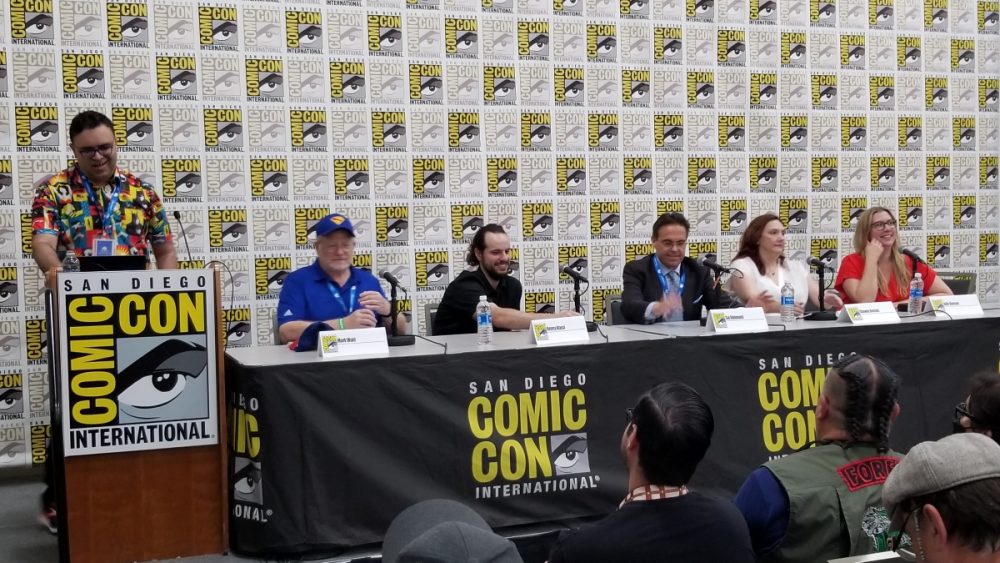
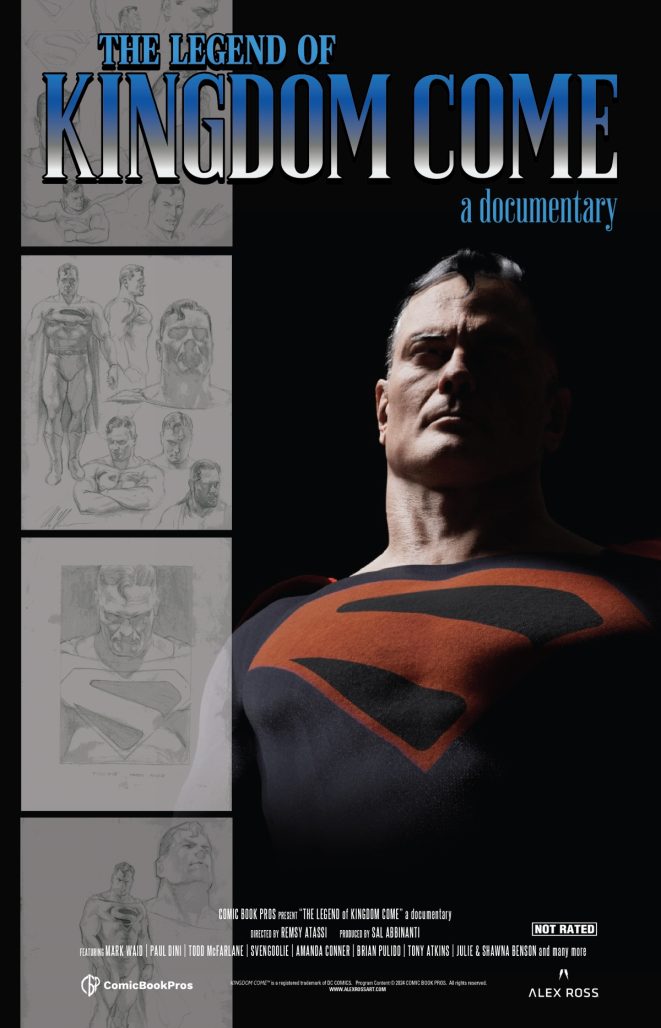

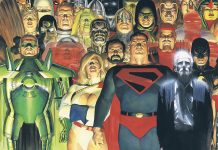
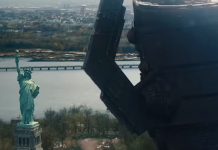






At San Diego Comic-Con 2024, the documentary The Legend of Kingdom Come was highlighted, showcasing a trailer that has generated significant interest among fans. The documentary explores the impact of the iconic comic book series Kingdom Come, written by Mark Waid and illustrated by Alex Ross, which redefined superhero storytelling.
Comments are closed.